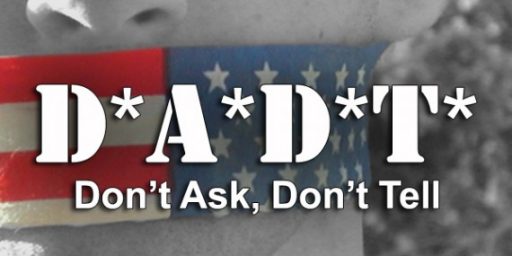Army Won’t Discharge Deploying Gays
Michael Demmons passes on word that the Army apparently has a wartime exception to “Don’t Ask, Don’t Tell.”
The regulation, contained in a 1999 “Reserve Component Unit Commander’s Handbook†and still in effect, states that if a discharge for homosexual conduct is requested “prior to the unit’s receipt of alert notification, discharge isn’t authorized. Member will enter AD [active duty] with the unit.†The 1999 document was obtained by researchers at the Center for the Study of Sexual Minorities in the Military (CSSMM), a think tank at the University of California, Santa Barbara during research for an ABC Nightline story.
Says Michael,
Seems like a good reason to cancel “Don’t Ask. Don’t Tell.†But it won’t be. DADT makes for good fund raising.
I’d note that DADT was a Clinton policy, although the ban on open homosexuals is longstanding. I’d note, too, that DADT is a policy imposed via Executive Order in compliance with Federal statute, The Uniform Code of Military Conduct.
That said, it wouldn’t surprise me if the Army was more hesistant to throw out people–for any cause–once deployment orders for a unit were issued. Otherwise, there might be a deluge of people who suddenly “discover” that they’re gay.
Arlo Guthrie suggested such a plan in 1967:
And if two people, two people do it, in harmony, they may think they’re both faggots and they won’t take either of them.
And there’s a lot less stigma attached to homosexuality now. Certainly, hippie peace activists wouldn’t call them “faggots.”
Update: In verifying the year of the song, I stumbled across this interesting WaPo piece from last month: Arlo Guthrie’s Storied Career. What particularly struck me was this nugget:
“Alice’s Restaurant” is sometimes construed as an antiwar song, though Guthrie has always said it’s more about the ways in which government works — or doesn’t.
“Most people don’t know we did as well at the PXs [commissaries on Army bases] and that it was hugely popular with the guys in Vietnam,” Guthrie says. “I have photographs and letters from guys who set up little ‘Alice’s Restaurant’ tents, who would get together and quote parts of the song that their superiors would have no knowledge of. I was obviously personally opposed to the war, but the song wasn’t about that, but about the absurdity of the situation that I found myself in, which was not unique to me — it was the same for hundreds of thousands of regular guys.”
Yep. Military folks probably have an especially accute sense of how screwed up bureaucracies can be.
This is also rather amusing:
“Alice’s Restaurant” would dip in and out of Guthrie’s repertoire, first retired after the end of the war in Vietnam, briefly replaced by another fable in which Guthrie talked about Richard Nixon owning a copy of “Alice’s Restaurant” and jokingly suggested that that might explain the famous 18 1/2 -minute gap in the Watergate tapes.
Heh.





This is pretty disturbing news. Since the ban on homosexual fornicators is put in place in order to insure operational efficiency, this means that order and effectiveness are being thrown to the wind.
Now the troops are going to be guided by latent satanic desires and will be focusing on carnal desires as opposed to beating the terrorists.
As long as homosexuals are accepted in the military, the terrorists will have an advantage.
Oh he’s good! (RabidRick I mean.) Satire needs to walk the knife edge of believability.
James, this has to be the death knell of the formal prohibition on gays in the armed services. The respectable argument advanced in favor of existing policy was that out homosexuals would reduce unit cohesion in combat. A policy that allows out homosexuals to serve in time of war but proscribes them in peace makes less than no sense per the official, often-stated rationale.
Jim: Presuming this is actually the policy, I agree. The policy is on its last legs, anyway, given broader acceptance of gays in society.
A damn interesting post!
Color me confused. Not that I don’t think DADT has proven pointless and counterproductive–it has–but as I read it, this says that if they get a complaint about homosexuality BEFORE they get orders for deployment, they’re to be ignored. Which would seem to suggest that they can proceed with discharge AFTER they get unit activation orders.
In other words, I’m completely lost because that makes no sense at all. Someone straighten me out here.
This one has me scratching my balding head. DADT has always been, so far, a commanders’discretion item for years, unless pressed. I’d guess at least 20% of the sailors on USS McKee when I served in the early 90s were gay (mostly female, since the crew was well over 50% female). It just wasn’t talked about as this was before DADT. [For those who do not know/remember, USS McKee was the subject of a 60 Minutes show about the witch hunt that occurred over lesbians in the Navy in the mid-1980s)
I also saw some very bad sexual politics. That is another subject largely ignored.